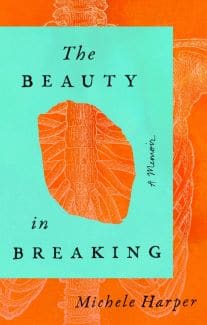 On Recuperation, Recovery, and Downward Facing Dogs
On Recuperation, Recovery, and Downward Facing Dogs
Author: Michele Harper
I am so not a doctor—which is to say I dislike needles and the sight of blood, and hospitals make me feel lightheaded.
I wasn’t sure, then, if reading Michele Harper’s memoir, The Beauty in Breaking, would be a terrific idea.
Harper is a Harvard-educated emergency room physician who has worked in the South Bronx and Philadelphia, and in her gracious debut she invites readers to try on her white doctor coat. From page one, I was expecting wailing sirens, shouting nurses, and gory wounds—people piled on stretchers with their intestines spilling out, etc.—but instead, The Beauty in Breaking is a decidedly quiet meditation on empathy and healing.
It wasn’t what I expected—and I loved it.
Harper introduces readers to some of her most challenging patients from the last decade. Their stories—which touch upon drug addiction, mental health, and cancer—are shattering and hopeful in their own right, but Harper goes a step further by braiding her own personal life into the narrative. She writes with candor and vulnerability about being the daughter of an abusive father, a wife whose marriage has reached its end, and a Black woman striving to get ahead in a field dominated by white males.
The takeaway from The Beauty in Breaking is that we’re all spectacularly messed-up in one way or another, whether we’re the patient or the physician. It’s not a new theme, but Harper considers it through a lens that feels fresh. She focuses on resilience, which in her case springs directly from tender and unapologetic self-care. Think meditation sessions, flowers from the market, homemade soup, and hot tea. Little things, sure, but together they fashion a suit of armor to keep her safe when tragedies come hurtling through the doors of the ER.
Yoga becomes Harper’s greatest tool for seeking a state of calm. As she unfolds her body into Extended Side Angle, she wonders, “Then the choice to bind. Does it enhance the pose to twist deeper and farther? … Can you expand within and beyond this bind while twisting and holding opposite limbs? And … can you remember to breathe all the while?” Some days her practice comes easily; others, she trembles from overexertion. “That’s when my breath gets caught in my flank and squeezed in my chest. But force is never the way.”
It’s this fascinating concept of binding that ultimately leads to Harper’s empowerment. She chooses to bind—or not—with patients, romantic interests, and family members, but the most significant bind is the one she pursues with herself.
Aside from a few bits of contrived and clunky dialogue, The Beauty in Breaking is akin to a deep exhale. Imagine settling into a well-deserved Child’s Pose after a sweaty workout, and that’s what it’s like to read Michele Harper’s words.
More Memoirs
When Breath Becomes Air ~ The Bright Hour
[AMAZONPRODUCTS asin=”0525537384“]
- Northwoods Author Amy Pease Interview and Book Recommendations - April 29, 2024
- Still True author Maggie Ginsberg:Interview and Book Recommendations - September 14, 2022
- When wood and words come together:A children’s picture book is born - June 30, 2022


